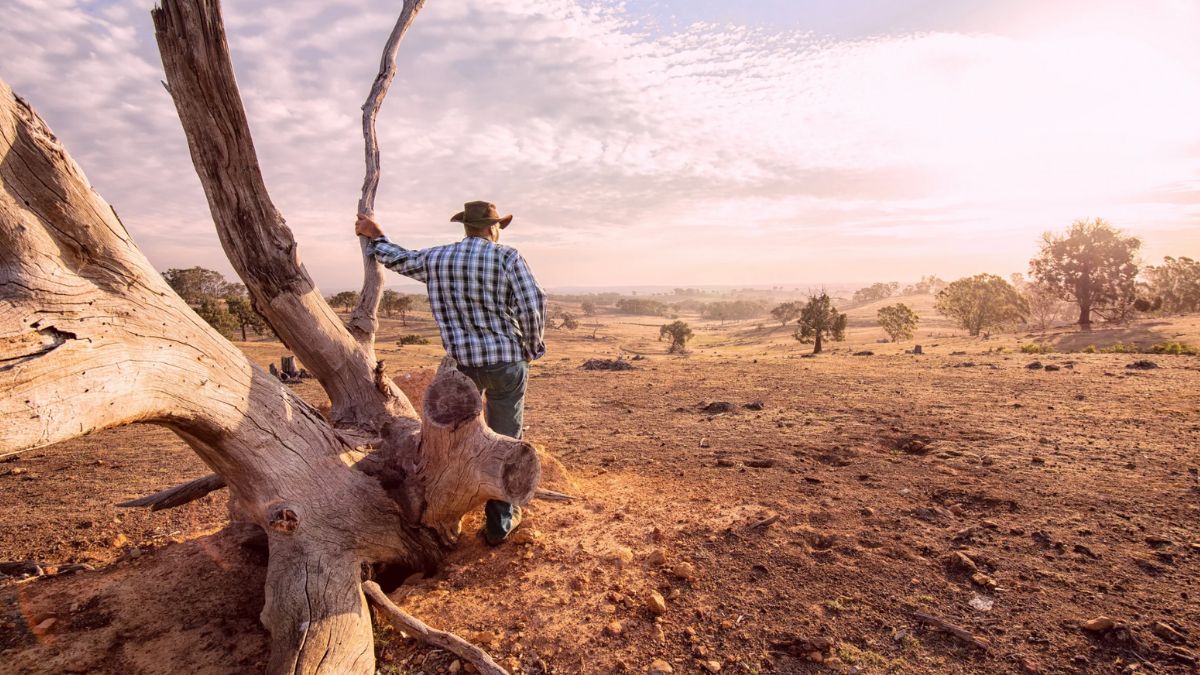Drought
Written by: Duncan B. on 26 June 2025
 Henry Lawson called drought the “red marauder.” Climate-change deniers and National Party politicians love quoting Dorothea Mackellar’s land of “drought and flooding rains” try to convince us that droughts are normal and natural in Australia.
Henry Lawson called drought the “red marauder.” Climate-change deniers and National Party politicians love quoting Dorothea Mackellar’s land of “drought and flooding rains” try to convince us that droughts are normal and natural in Australia.
There is no doubt that Australia is a land of drought. Bureau of Meteorology records show that on average, Australia experiences a severe drought every 18 years. Many droughts have been recorded in Australia from the early days of colonisation to the present. They include the Federation drought of the early twentieth century, the World War 2 drought of 1937- 45 and the Millennium drought of 1996 - 2010.
At present, parts of South Australia, most of western Victoria and northern Tasmania are experiencing severe drought. The Federal and state governments have belatedly come to the assistance of drought-affected farmers with various cash grants and plans to improve farmers’ access to hay. The Victorian Government has paused the introduction of a higher Emergency Services levy on drought- affected farmers. As usual these band-aid measures are too little too late.
Droughts existed in Australia before colonisation, but indigenous Australians managed their lives to deal with them. They moved from place to place as the availability of food and water dictated, taking only what they needed and leaving sufficient supplies for other people and for future use. They set aside areas of food plants and game as sanctuaries which were left untouched to ensure food for the future.
With colonisation came farming practices which quickly began to degrade the land and worsened the effects of droughts. Sheep compacted the soil so that rainwater ran off instead of soaking into the ground. Large-scale clearing of trees led to a reduction in rainfall, and this, combined with the destruction of native grasses by sheep led to soil erosion and fierce dust storms.
The effects of climate change will make hot days hotter, increase the severity of extreme rainfall events and increase the likelihood of droughts in Australia. Government hand-outs to farmers will not solve the problem of drought. Only reducing and reversing the effects of climate change will achieve that.
Many farmers are deeply involved in developing innovative farming practices which seek to reduce the effects of agriculture on the environment and reduce the use of inputs such as fuel, electricity and water. Many have gladly accepted wind turbines and solar panels on their farms. In embracing action against climate change these farmers are working towards making agriculture sustainable in Australia. They are leaving behind the climate-change denying, nuclear power- loving dinosaurs of the National Party.
Print Version - new window Email article
-----
Go back
Independence from Imperialism
People's Rights & Liberties
Community and Environment
Marxism Today
International
Articles
| More Invasion Day reports |
| Invasion Day in Sydney: ‘We are stronger than their lies, Stronger than their prisons’ |
| The politics of “non-political” appointments |
| On January 26 we celebrate resistance, mourn losses and speak truth. |
| New Federal environmental laws insufficient for forests’ survival |
| Net Zero targets – Peoples struggle against Green and Brown Capitalists |
| WA rally for Queer and Trans rights |
| Return WA's freight rail to the workers |
| Why did heroes succeed after police leadership and ASIO fail at Bondi? |
| 8000 Rising Tide protesters enforce Newcastle Port shutdown |
| Modern slavery contributes to Supercars championship profits |
| People's struggle continues against SA government " love affair" with property developers and their $1 per year rent! |
| Book Review: The New Age of Sexism |
| Tuvalu: global warming forces diplomatic reappraisal |
| The uphill struggle to protect NSW’s Koalas |
| We have strength to stop Israel’s participation in cycling’s Tour Down Under |
| We welcome the call for a climate-based and more independent foreign policy. |
| Sovereign Citizens: A few inconvenient home-truths for the centre-right |
| That old divide and conquer songbook |
| Toe to toe with fossil fuel induced global warming |
-----
